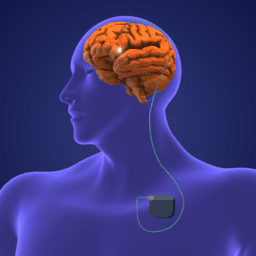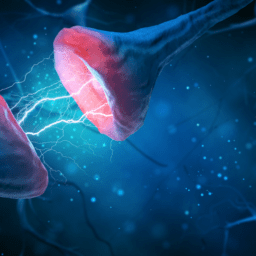More biomarker news, an exposé in The Guardian regarding Paraquat, sex-specific differences and symptom severity, and more in this month’s news roundup!
PARKINSON’S SCIENCE AND RESEARCH NEWS
- More alpha-synuclein seed assay biomarker news: researchers have used skin samples to identify different sub-types of Parkinson’s. The previous seed assay biomarker news involved cerebrospinal fluid.
- An article in The Guardian describes efforts by the manufacturer of Paraquat to influence scientific and other reporting about the connection between Paraquat and Parkinson’s.
- Results from a survey of more than 750 Parkinson’s care partners highlight the many challenges care partners face.
- A study involving 3500 people reports on an AI-powered analysis of which Parkinson’s symptoms are reported by people with Parkinson’s as being the most troublesome.
- A study from the UK examines women’s health and Parkinson’s. It considers how sex-specific experiences may contribute to Parkinson’s severity.
- In a study involving 375 people, newly diagnosed males living with Parkinson’s had a greater extent of brain atrophy and cortical thickness reduction than newly diagnosed females at the start of the study, and the difference between the sexes was maintained over two years.
- In Movement Disorders, researchers provide an overview of the ways in which Parkinson’s pathology involves more than just dopamine.
- In a large study, people with essential tremor were three to four times more likely to develop Parkinson’s than age-matched controls.
- Researchers report on the influence of smoking, coffee consumption, and aspirin use on motor and non-motor symptoms of Parkinson’s.
- Ursodeoxycholic Acid, a drug used for more than 30 years to treat bile duct dysfunction, was safe and well tolerated in a study using the drug to treat Parkinson’s. The treatment showed signs of helping with gait function.
- Researchers have used an artificial enzyme to facilitate the continuous production of dopamine in mice.
- The use of prebiotic fiber supplements was safe and modified microbiome constitution in a study of people with Parkinson’s.
- In a study of over 400 people, lower baseline dopamine transporter levels and higher levels of daily levodopa were found to correlate with a higher risk of cognitive impairment.
- A study of 183 people with Parkinson’s finds that there are three distinct types of mild cognitive impairment in de novo Parkinson’s.
- Researchers in Brain report on genetic risk factors for developing Parkinson’s Disease Dementia.
- In Genetics in Medicine, researchers report on the feasibility and impact of providing genetic testing and counseling to people with Parkinson’s.
- Researchers in Movement Disorders report on the global use of genetic testing in Parkinson’s. They found regional differences in availability, most notably in Africa. They also found that insurance is most likely to cover testing and counseling in Europe.
- A discussion of re-emergent tremor appears in Movement Disorders. The article compares different types of tremors, including postural, essential, dystonic, and rest tremors.
- Measuring electrical activity in the brain can identify different subtypes of Parkinson’s and may help establish a prognosis for progression.
- In npj, researchers report that the Perdue Pegboard Test and imaging studies may be able to help establish a prognosis for the progression of Parkinson’s and Parkinson’s-plus syndromes.
- The Journal of Neurology features an overview of non-motor symptoms in atypical Parkinson’s.
- Researchers report that diminished dopamine transporter levels correlate with increased rates of apathy.
- Military trauma, including PTSD and traumatic brain injury, is associated with the development of Parkinson’s.
PARKINSON’S TREATMENTS and THERAPIES
- A detailed description of the treatments currently in clinical trials for Parkinson’s.
- More reason to stay active and avoid interruptions to your exercise regimen: researchers have found that physical therapy does not reverse the worsening of symptoms following an interruption to exercise-based therapy.
- In a small study, researchers found similar rates of impulse control disorders amongst people who have undergone DBS surgery for Parkinson’s and people who exclusively treat Parkinson’s pharmaceutically.
- The latest in a conversation amongst researchers about hypoxia therapy for Parkinson’s appears in BMC Neurology.
- Programs focusing on traditional forms of Brazilian dance may help to improve life quality and ease motor symptoms for people with Parkinson’s disease, a new study reports.
PARKINSON’S LIVING WELL STORIES
- Three years after being diagnosed with young onset Parkinson’s, Matthew Moore, from Columbus, Ohio, continues to pursue his love of acting. Moore has written a play about Parkinson’s and is performing in Hamlet.
- Sharon Mcdonough was diagnosed with Parkinson’s at age 39. She has invented a tool that has helped her and others to improve their symptoms, the Eye Guide MC.
- Founded in the Fall of 2020, the Parkinson’s Wellness Project in Victoria, British Columbia, is a non-profit that aims to alleviate some of the pain for survivors and their families.
- Emma Staub writes about the importance of grief and swearing in living well with Parkinson’s.
- Parkinson’s can boost creativity: a story from Parkinson’s Life.
- Since being diagnosed with Parkinson’s, Lourdais Michel Penhard has been pedaling against pathology.
- Comedian Paul Mayhew-Archer, best known for co-writing The Vicar of Dibley, will be raising money and awareness for the Winchester branch of Parkinson’s UK with a comedy night in Hampshire.
- A top scientist has thanked members of the Chepstow and District Parkinson’s Support Group for its contribution to pioneering research.
- Gillian Lacey-Solymar was diagnosed with YOPD ten years ago, and an article on thetimes.co.uk describes how creativity has been part of her journey of living well with Parkinson’s.
- Alison Anderson is taking the longest bike trip of her life, riding from her home in Cheltenham, UK, to Barcelona, Spain. The 54-year-old, who was diagnosed with Parkinson’s in 2015, is undertaking the 1,100-mile journey to raise funds for charity, all the while spreading awareness of the condition she has lived with for the past eight years.
- Community healthcare workers in Illinois are stepping up to help people with Parkinson’s.
PARKINSON’S SURVEYS, CLINICAL TRIALS, AND VOLUNTEER OPPORTUNITIES
- UK researcher and physician Tom Foltynie writes about ways to improve the structure of clinical trials for Parkinson’s.
- Biogen announced that they’re discontinuing the LIGHTHOUSE trial. They note that the discontinuation results from evaluating the complexities and duration of the study and that the decision does not result from any safety or efficacy data. The LUMA study will continue, and participants in the LIGHTHOUSE study will be invited to participate.
- Researchers in Norway are investigating the efficacy of ambroxol in people with Dementia with Lewy Bodies.
- Researchers in the UK, in partnership with the Women’s Parkinson’s Project and MyMovesMatter, invite participation in a survey about the experience of menopause for women with Parkinson’s.
- Another study of ambroxol is launching. The DUPARG study is recruiting participants in Groningen, Netherlands.
- A new trial examining the possible neuroprotective effect of exercise has been listed by the University of Nevada.
- Researchers at Oregon Health and Sciences University are conducting a study to test whether a specific, dynamic exercise intervention can help prevent falls in people with Parkinson’s. This study uses safety equipment, including harnesses, to facilitate a regimen that involves turning while walking.
- University of Rochester Center for Health + Technology is undertaking a survey study to assess the ability of the Parkinson’s Disease-Health Index to measure patient-relevant changes in disease burden over the course of two years. Participants will complete surveys five times over two years and must be over 18, speak English, and have a self-reported or clinical diagnosis of Parkinson’s. More information is available here.
- Are you a grandparent living with Parkinson’s while also serving as the primary caregiver for your grandchildren? Do you want to connect with people in similar situations? Let us know by filling out this form.
- Researchers at Columbia University’s Irving Medical Center are seeking participants for a study exploring the role of immune response in Parkinson’s. Participation is open to those with and without Parkinson’s and will involve donating blood, a questionnaire, a cognitive test, and a neurological examination. Click here to express interest in participating.
- John’s Hopkins has announced a trial to evaluate whether levetiracetam can improve symptoms of Parkinson’s psychosis. The trial is not yet recruiting, but the plan is for the trial to begin by September. The trial design features a crossover assignment, which means that every participant will receive an active trial drug for part of the trial.
- The LUMA trial continues to recruit participants. This trial aims to assess the safety and efficacy of BIIB122 tablets in slowing the progression of early-stage Parkinson’s. This study has sites in the US, China, France, Germany, the Netherlands, Poland, Spain, and the UK.
- The ACTIVATE trial is recruiting participants for a phase 2 trial of BIA 28-6156 in people with GBA mutations. This 78-week trial has site locations in the US, Canada, and Europe.
- In Colorado, a study the Foundation is funding continues to recruit participants. The study will explore low-load resistance training with blood flow restriction in order to help develop exercise interventions to help improve the quality of life for people with advanced Parkinson’s.
- Washington University School of Medicine is sponsoring a study that aims to enroll participants with idiopathic REM sleep behavior disorder, as well as healthy controls, to prepare for a trial of neuroprotective treatments against synucleinopathies.
- Florida State University is sponsoring a study of speech articulation deficits in Parkinson’s.
- A study in South Carolina aims to identify brain biomarkers to predict the risk of cognitive change following DBS surgery.
- A survey for those in Ireland seeks to understand the influence of Parkinson’s symptoms and other factors on the quality of life of people with Parkinson’s.
- Another survey for those in Ireland seeks to understand how people access information about Parkinson’s.
- A trial sponsored by the University of Aberdeen in Scotland is recruiting participants for a study of the effects of constipation and changes in the microbiota in Parkinson’s.
- US-based company Neuronascent announced plans for a phase II trial of their neuro-restorative agent NNI-362. The agent is disease-agnostic, and a previous phase I trial for Alzheimer’s disease produced positive early-stage findings.
- Sinopia Biosciences announced that they have secured funding for a clinical trial to explore the safety and efficacy of their novel agent in treating levodopa-induced dyskinesia.
- Staying Connected through Communication Study – The University of Washington SPEAC Lab invites individuals living with Parkinson’s to answer survey questions about their communication experiences. This is an online survey study that will take about 30-45 minutes. (Paper surveys are also available.) People with Parkinson’s and their family/friends/coworkers will complete SEPARATE surveys, and data are not shared between participants. This study is open to anyone in the U.S. Each participant will be mailed a $25 check upon survey completion. Learn more and enroll here.
- PreActive PD Study – This study, available for both English and Spanish speakers, implements an occupational-therapist-delivered physical activity behavior change coaching intervention in people with early-stage Parkinson’s. The study is based upon a recent single-arm cohort feasibility study (Pre-Activate PD/HD) that evaluated acceptability, implementation, and resulting effect estimates of the Pre-Activate PD intervention in 13 participants. The intervention provides one-on-one coaching sessions from an occupational therapist to individuals newly diagnosed with Parkinson’s. The individualized structured support in the sessions is aimed at facilitating and optimizing exercise uptake as part of an effective self-management program. Learn more and enroll here.
- Gamma Wave Trial – Sponsored by the Massachusetts Institute of Technology (MIT), this trial will investigate the efficacy of a non-invasive method of neuromodulation called Gamma Entrainment Using Sensory Stimulation (GENUS) for managing Parkinson’s motor symptoms. GENUS is administered via light, sound, and tactile stimulation devices and has been tested on cognitively normal individuals and individuals with mild Alzheimer’s, and the device was found to be safe for use and effective for entrainment in both populations. Learn more here.
- Phoenix-Area Residents – Deep Brain Stimulation (DBS) and Exercise Study at Barrow Neurological Institute – This study aims to help researchers learn more about how aerobic exercise affects symptoms of Parkinson’s and the quality of life in people who have DBS. They will also look at brain wave activity using the Medtronic Percept DBS device in order to better understand what changes in the brain might be caused by exercise and how that affects Parkinson’s symptoms. Reach out to Markey if interested.
- Colorado Oral Strengthening Device – The University of Colorado is looking for adults with Parkinson’s to participate in a research study exploring how a novel low-technology device can achieve an increase in tongue strength comparable to standard-of-care exercise using tongue depressors but with the kinematics and simple biofeedback of existing high-cost devices. Research has shown that tongue resistance exercises paired with biofeedback have resulted in improved tongue strength to support chewing, control of food and liquid in the mouth, and propulsion of material for a swallow. Learn more and enroll here.
- PD GENEration – The Parkinson’s Foundation has announced a major expansion of its national study to make genetic testing and counseling more available for people with Parkinson’s. The study (NCT04057794) hopes to enroll 15,000 people in all 50 US states, Puerto Rico, and the Dominican Republic. Details are available here. For questions about enrollment, email [email protected]. Know someone who speaks Spanish and wants to learn more and maybe participate in the study? Share this link.
- Parkinson’s Progression Markers Initiative – In an expanded study, the Parkinson’s Progression Markers Initiative (PPMI) is currently working to enroll up to 100,000 people with and without Parkinson’s. The study team is especially seeking to enroll people diagnosed with Parkinson’s in the past two years and who are not yet on treatment, as well as people 60 and older who aren’t living with Parkinson’s but have a risk factor for it (such as a close relative with Parkinson’s, a known Parkinson’s-associated mutation, and/or REM sleep behavior disorder). The observational study is also enrolling people with no known connection to Parkinson’s to serve as a control group. Learn more here.
- TOPAZ (Trial of Parkinson’s and Zoledronic Acid) – Caroline Tanner, MD, PhD, is recruiting participants for a new remote clinical trial led by a team of Parkinson’s experts at UCSF in partnership with researchers from across the country. The study aims to help people with Parkinson’s or Parkinsonism maintain their independence by reducing the risk of hip fractures. The study will test if zoledronate, an FDA-approved medication for osteoporosis, can prevent fractures in people with Parkinson’s, whether or not they have osteoporosis. To learn more, visit the study website at TOPAZstudy.org, email [email protected], or call (415) 317-5748.
- Join Google and LSVT in Project Euphonia – LSVT Global has partnered with Google on an exciting research project called Project Euphonia to help improve automatic speech recognition software for people with speech disorders. These disorders may make using devices like Google Home, The Nest, and other Smart devices, Siri, Alexa, or speech-to-text frustrating. To do this, LSVT Global needs samples of disordered speech to train the system. You are encouraged to enroll if you’ve been diagnosed with Parkinson’s, PSP, MSA, or CBD with mild, moderate, or severe speech disorders. Participation is easy, can be done from your own home, and can earn you a $60 gift card! Learn more here.
- A PD Avengers research group is undertaking a new project called Sparks of Experience, designed to be more systematic about collecting and considering the experiences and ideas that come from the curious minds of people living with Parkinson’s. “In the past, these sometimes quirky ideas inspired by lived experience have turned into significant new directions for research. It could be said we are trying to capture serendipity,” the team says. To learn more and get involved, see the flyer here.
- Game-based Exercise Project – Researchers at the University of Auckland are investigating how games can be used as potential rehabilitation systems. This project aims to develop suitable game-based exercise experiences to help people living with Parkinson’s. If you are 45 or older, living with a chronic condition such as Parkinson’s, and/or are experiencing age-related health conditions, you are invited to participate in a survey that will help the researchers to understand the community’s interests in games and gameplay in the context of exercise and rehabilitation. To learn more and take the 15-minute survey, see the flyer here.
- SPARX3 – A Phase 3 Clinical Trial about Exercise and Parkinson’s – This research team is currently seeking volunteers to participate in a clinical trial about the effects of aerobic exercise on people with Parkinson’s. Learn more and see if you qualify here. For more details, contact Katherine Balfany at [email protected].
- PAIRing Up – If you are a person with Parkinson’s or a care partner to someone with Parkinson’s, you are invited to participate in an online survey to address neuropsychiatric (cognition, depression, anxiety) concerns in Parkinson’s. The survey aims to learn about the needs and priorities for clinical care, education, support, and research related to neuropsychiatric symptoms. To learn more and participate, click here to download the flyer.
- The University of Oulu and collaborators from Aalborg University, Fraunhofer University, the University of Manchester, the University of Glasgow, the University of Lisbon, and the University of Melbourne, are conducting a survey for people with Parkinson’s and Parkinson’s care partners about self-care. Complete the survey here to share your self-care strategies and techniques. You can also review ideas submitted by others and add them to your own self-care toolbox.
- Home-based Exercise and Cognitive Behavior Therapy – University of Alabama in Huntsville
- Speech and Telemedicine Study – The Purdue Motor Speech Lab
- Parkinson’s and Service Dogs – University of Groningen, Netherlands
- Neurology Study Interest Registry – University of Rochester
- Park Test – University of Rochester
For more of what’s new in Parkinson’s news, check out our full series here.
WANT MORE PRACTICAL ARTICLES LIKE THIS?
You can learn much more about living well with Parkinson’s today through our Every Victory Counts® suite of resources. Each manual is packed with up-to-date information about everything Parkinson’s. Click the link below to order your manual(s).

















